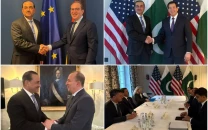Dubious wisdom of keeping secrets
What will the country do with speculation and ‘leaks’ that continue to destabilise the state?

About PNS Mehran, we know that the National Assembly Standing Committee on Defence has been briefed by top military officials about the details of how ‘inside’ assistance was available to the terrorists. Is this reason enough to make the entire report secret? Maybe, but the consequences of keeping quiet should also be considered. The nation already knows that inside help was forthcoming to the terrorists; leaving the information restricted to this point will simply give rise to conspiracy theories about the armed forces, that perhaps there is something that is being deliberately concealed from the public.
The airing of the Kharotabad inquiry was being looked forward to by citizens to confirm where the truth lay, after the media had one-sidedly indicted the security forces. There is a video circulating on the internet which shows the killed Dagestani-Russian and Tajik men and women taking terrorist training in a camp in Waziristan. The content of the video is shocking. The innocent group, including one pregnant woman, are seen happily learning how to fire lethal weapons and use suicide jackets. But after the inquiry report was sealed, the mystery continues.
One reason why the reports need to be made public is that two versions invariably emerge about the incident being inquired into. For instance, the killing of two boys by a mob in Sialkot last year was closed as a grave violation of the vigilantes. Later, findings showed that the two brothers were actually dacoits, preying regularly on a community that finally caught them and killed them with the help of the police. The killing was still a crime, but the facts turned out to be different from what was made public. The reaction of security agencies to the killing of journalist Saleem Shahzad has been flecked with anger; but the unfurling of more information after the arrest of Hizbut Tahrir sympathisers in the army has unleashed speculation.
Withholding of information as security is practiced all over the world, but in most cases it doesn’t work. Concealment has not saved any state from the dangers of insecurity. The government thought it would redound to the security of the state to seal the Hamoodur Rehman Commission Report on the East Pakistan debacle; but developments later showed that it was a mistake to allow a point of view to develop inside Pakistan in opposition to what the world outside already knew. Were the armed forces saved from a steep fall of reputation by making the report secret? The same thing happened with the Shafiur Rehman Commission Report on the death of General Zia in the Bahawalpur air crash. The report, still secret, was inconclusive but Justice Shafiur Rehman had stated in it that it had to remain inconclusive because the army would not let the inquiry go on. Today, everyone knows — albeit unofficially — that General Zia was killed by elements inside the army.
Inquiry reports are not ‘judgments’; they are findings that keep citizens informed and on the basis of which the government can employ the various avenues of legal action at its disposal. It is up to the government to take action or to shelve the report. If, however, the report is not made public — the excuse is usually ‘state security’ — then the government is absolved from taking any action. And the question remains: What will the country do with speculation and ‘leaks’ that continue to destabilise the state?
Published in The Express Tribune, July 1st, 2011.



















COMMENTS
Comments are moderated and generally will be posted if they are on-topic and not abusive.
For more information, please see our Comments FAQ